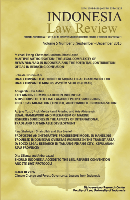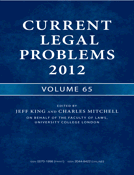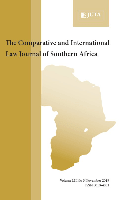
Lexonomica
Scope & Guideline
Bridging Legal Theory and Socio-Economic Insights
Introduction
Aims and Scopes
- Legal and Policy Analysis:
The journal emphasizes rigorous legal analysis and policy evaluation, addressing issues from national and international perspectives. - Socio-Economic Implications of Law:
It explores how legal frameworks affect socio-economic factors, such as income disparity, climate justice, and digital privacy. - Interdisciplinary Research:
Lexonomica encourages interdisciplinary studies, integrating legal studies with economics, sociology, and environmental science. - Emerging Legal Challenges:
The journal focuses on contemporary legal challenges, including those arising from technological advances, climate change, and global conflicts. - Comparative Law Studies:
It provides insights into comparative legal frameworks, examining differences and similarities across jurisdictions.
Trending and Emerging
- Climate Change and Law:
The journal is increasingly publishing on the legal aspects of climate change, reflecting a growing concern for climate justice and policy implications. - Data Privacy and Cybersecurity:
With the rise of digital technology, there is a significant focus on legal frameworks governing data privacy, highlighting the implications of new regulations such as the EU's data privacy laws. - Legal Implications of Artificial Intelligence:
The integration of AI in various fields is prompting discussions on its legal ramifications, showcasing a trend towards analyzing technological impacts on law. - International Jurisdiction and Enforcement:
There is a rising trend in exploring issues related to jurisdiction and enforcement in cross-border legal matters, indicating a growing complexity in international law. - Socio-Economic Disparities and Legal Responses:
Research addressing how legal systems respond to socio-economic disparities, particularly in the context of poverty and access to justice, is becoming increasingly prominent.
Declining or Waning
- Traditional Legal Doctrines:
There has been a noticeable decline in papers focusing on established legal doctrines and theories, as the journal increasingly prioritizes contemporary issues. - Narrowly Defined Legal Issues:
Research that centers solely on specific legal issues without broader socio-economic implications has decreased, reflecting a shift towards more comprehensive analyses. - Localized Legal Studies:
There is a waning interest in purely localized legal studies, as the journal leans towards global and comparative perspectives.
Similar Journals

Derecho PUCP
Connecting researchers with contemporary legal challenges.Derecho PUCP is a distinguished open access journal published by the Pontificia Universidad Católica del Perú, specifically from the Faculty of Law. With a commitment to advancing legal scholarship, this journal has been an essential resource in the field of law since 2005, providing researchers, practitioners, and students with access to critical analyses and discussions on various legal topics. Based in Lima, Peru, Derecho PUCP holds a prestigious position with a Q2 ranking in the Law category, reflecting its impactful contributions to the social sciences, particularly in the legal domain. The journal publishes cutting-edge research and promotes innovative discourse, aiming to foster academic excellence and engage with contemporary legal challenges. As it continues to converge into its future issues from 2019 to 2024, Derecho PUCP exemplifies a vital platform for those committed to the pursuit of legal knowledge and research.

Indonesia Law Review
Innovating Legal Scholarship for a Global AudienceIndonesia Law Review is a premier open-access academic journal dedicated to advancing knowledge in the fields of law and social sciences, with particular emphasis on the Indonesian legal landscape. Established by the Indonesian Law Review, this journal has made significant strides since becoming open access in 2014, ensuring that research is freely available to a global audience. Based in Depok, West Java, the journal seeks to foster scholarly discourse on legal issues pertinent to Indonesia, while also contributing to the broader field of education and social sciences. With its current Scopus rankings placing it within the top tiers of law and social sciences, including a Q3 categorization in law and a Q4 classification in education and miscellaneous social sciences, the **Indonesia Law Review** serves as a vital platform for researchers, professionals, and students to disseminate their findings and engage with contemporary legal dilemmas. The journal is committed to providing a robust forum for innovative legal scholarship and is an essential resource for anyone seeking to understand the complexities of law in Indonesia and beyond.

National Taiwan University Law Review
Exploring the Dynamics of Law in AsiaNational Taiwan University Law Review, with ISSN 1812-6324, is a prestigious academic journal published by the NATIONAL TAIWAN UNIVERSITY COLLEGE OF LAW. As a pivotal platform in the field of law, this journal aims to foster scholarly discourse and promote the exchange of ideas regarding legal theories, practices, and developments, particularly within the context of Taiwan and the broader Asian legal landscape. Although it does not currently offer open access, its selectivity ensures a high standard of peer-reviewed research, appealing to researchers, legal practitioners, and students alike. The journal's commitment to exploring contemporary legal challenges and ideologies positions it as an essential resource for those seeking to enhance their understanding of the dynamic legal systems in Asia and beyond. Located in Taipei City, Taiwan, the National Taiwan University Law Review invites contributors and readers who are passionate about advancing legal scholarship and practice.

Current Legal Problems
Connecting scholars to the pulse of legal innovation.Current Legal Problems is a premier academic journal published by Oxford University Press, dedicated to advancing the field of law through critical analysis and interdisciplinary research. With an ISSN of 0070-1998 and an E-ISSN of 2044-8422, this journal has established itself as a vital resource for legal scholars and practitioners alike since its inception in 1983. Recognized with a Q1 category ranking in Law for 2023, it ranks notably in Scopus as #415 out of 1025, placing it in the 59th percentile, further underlining its influence and importance. The journal's scope encompasses contemporary legal issues, providing a platform for innovative legal thought and discussion. Although it does not follow an open access model, the journal remains accessible through both print and digital subscriptions, catering to a global audience from its base in Oxford, United Kingdom. Researchers, students, and legal professionals will find Current Legal Problems indispensable for staying informed about the latest legal developments and scholarly debates.

Utrecht Journal of International and European Law
Unlocking Insights in International LawUtrecht Journal of International and European Law, published by UBIQUITY PRESS LTD, serves as a dynamic platform for the dissemination of scholarly research in the realms of international and European law. Since its inception as an open-access journal in 2013, it has provided unrestricted access to cutting-edge legal scholarship, fostering global dialogue among legal professionals, researchers, and students. With a notable Scopus rank of 249 out of 1,025 in the law category and a commendable Q3 rating, the journal emphasizes innovative legal theories and practices relevant to contemporary global challenges. Located in the heart of the United Kingdom, the Utrecht Journal is committed to maintaining high academic standards while also promoting the exchange of knowledge across borders, which is crucial given the ever-evolving landscape of international law. As it converges its focus from 2020 to 2024, the journal seeks to become an essential reference for those dedicated to the exploration and expansion of legal discourse in this vital field.

European Journal of Legal Studies
Navigating the Complexities of European Legal FrameworksEuropean Journal of Legal Studies is a distinguished open-access journal published by the European University Institute in Italy, focusing on the multifaceted field of law. Established in 2007, this journal provides a vital platform for the dissemination of innovative legal research and critical analyses, promoting scholarly dialogue across diverse legal disciplines. With an H-index demonstrating its influence and a Scopus ranking of 445 out of 1025 in the Social Sciences Law category, the journal is recognized for its contributions to the academic community, reflected in its Q3 quartile status as of 2023. The European Journal of Legal Studies invites researchers, professionals, and students to engage with its rich repository of legal scholarship, fostering an understanding of contemporary legal issues within a European context. The journal is easily accessible online, encouraging collaboration and knowledge-sharing among scholars worldwide. For further details and to explore its latest articles, please visit its website.

AMERICAN JOURNAL OF COMPARATIVE LAW
Navigating the Complexities of Comparative Legal StudiesAmerican Journal of Comparative Law is a premier scholarly publication dedicated to the field of comparative law, published by Oxford University Press. Established in 1974, the journal has consistently served as a vital resource for researchers, practitioners, and students seeking insights into the legal systems across different jurisdictions. With an impressive ranking of Q3 in both the Law and Miscellaneous Social Sciences categories for 2023, it reflects a solid position in the academic landscape, ranking 400 out of 1025 in the Scopus database, placing it in the 61st percentile. The journal offers comprehensive analyses and discussions that foster understanding and dialogue around legal principles and practices, making it an invaluable tool for those involved in legal scholarship or practice. While it does not currently offer open access, the journal's commitment to high-quality, peer-reviewed content ensures that it continues to be a pivotal outlet for legal research and comparative studies.

Comparative and International Law Journal of Southern Africa-CILSA
Innovating Comparative Law Perspectives in Southern AfricaComparative and International Law Journal of Southern Africa (CILSA) is a prestigious academic publication dedicated to advancing the understanding of comparative and international law within the Southern African context. Published by the University of South Africa, Institute of Foreign & Comparative Law, CILSA serves as a critical platform for scholars, practitioners, and students to explore significant legal issues and developments that impact the region and beyond. The journal's ISSN is 0010-4051, ensuring its visibility and accessibility within academic circles. While CILSA currently operates under a traditional publishing model, it remains committed to providing high-quality, peer-reviewed research that addresses pressing legal challenges and promotes informed discourse. With a mission to bridge the gap between different legal systems and encourage comparative analysis, CILSA is essential reading for anyone invested in the evolution of law in a globalized world.

UNIVERSITY OF ILLINOIS LAW REVIEW
Illuminating the Path of Legal Understanding and ResearchUNIVERSITY OF ILLINOIS LAW REVIEW, published by the esteemed University of Illinois, stands as a pivotal forum for legal scholarship since its inception. With an ISSN of 0276-9948 and an E-ISSN of 1942-9231, this journal serves the legal community by offering rigorous analyses and innovative insights into contemporary legal issues, making it an essential resource for researchers, legal practitioners, and students alike. Although not an open-access journal, it operates within the United States, with contributions stemming from a rich academic tradition. Notably, it holds a respectable Q3 category ranking in Law according to the 2023 category quartiles and ranks 360th out of 1025 in the Scopus Social Sciences Law rankings, placing it in the 64th percentile, affirming its significance in the legal discourse. The journal's scope encompasses a broad range of legal topics, from constitutional law to international legal studies, thus catering to a diverse readership keen on advancing their understanding of the law. In an era marked by evolving legal landscapes, the UNIVERSITY OF ILLINOIS LAW REVIEW remains committed to fostering intellectual engagement and promoting scholarly exchange among all members of the legal field.

University of Western Australia Law Review
Connecting Scholars and Practitioners in Legal ResearchThe University of Western Australia Law Review is a prestigious academic journal dedicated to the critical examination and exploration of legal issues in Australia and beyond. Published by the Law School of the University of Western Australia, this journal has become a significant resource for legal scholars, practitioners, and students alike, contributing to the rich discourse in the field of law. With an ISSN of 0042-0328 and a current categorization in the Q3 quartile in the field of Law as per the 2023 rankings, it stands among a cohort of respected legal publications. The journal, though not open access, facilitates a sharing of unique insights and research from 2019 to 2024, aiming to address emerging and traditional legal challenges within a global context. With a Scopus rank of #651 out of 1025 in Social Sciences Law, it holds a percentile of 36, reflecting its valuable contributions to legal scholarship. The University of Western Australia Law Review invites researchers, practitioners, and students to engage with its rich content and to contribute to the ongoing dialogue shaping the future of law.